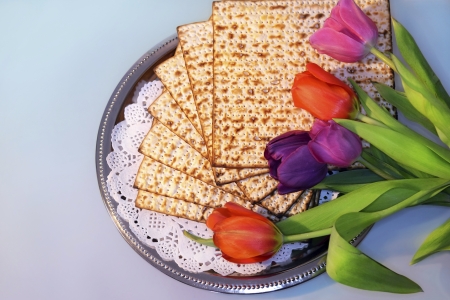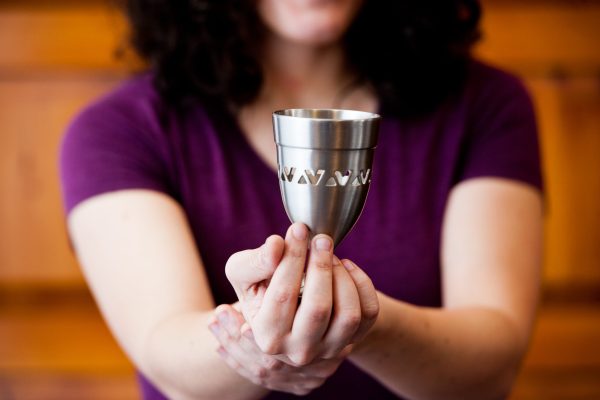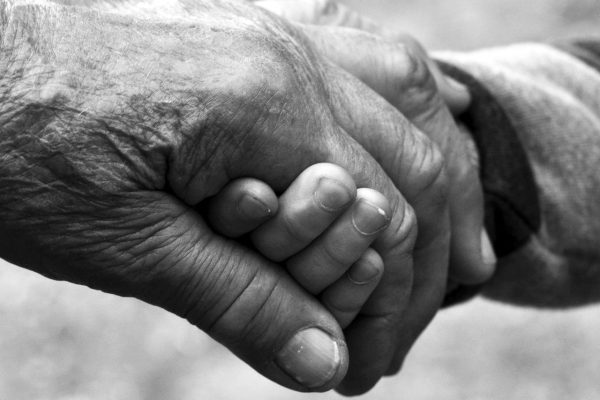Outline for a seder focused on the contributions of women and girls to the Passover story and to Jewish history.
Introduction
The impetus for this seder was that our granddaughter, Hannah, has been asking questions about why the Torah is unfair to women in that its stories are all about men. She wants to know what the women were doing. We thought that would make an excellent theme for the Seder, one we have certainly acknowledged in readings in our previous sedarim, but not centered. We approached it two ways: how do we incorporate women’s voices into the Seder? How do we center the liberation of women as a theme for the seder?
We always ask our guests to contribute to the content of the seder. This year, we reminded everyone that we wanted to “pitch it” at the level that a seven-year-old could engage. Here is the overall framing we used this year:
I. (Leader): Introduction to the seder
What we’re doing tonight: Celebrating/remembering women, in at least two senses:
- Highlighting the contributions of women to our history, and the story of the Exodus from Egypt, in particular.
- Thinking about the more contemporary women’s movement(s), the women who have made changes, and what we can learn from—and for—both our history and our future from studying about these women.
II. “Assignments”
1. We will dedicate each of the four cups to a woman.
- First cup: a woman in the Torah other than in the Exodus narrative
- Second cup: a woman in the Tanakh but not in the Torah
- Third cup: a Jewish woman between the Tanakh and the modern period
- Fourth cup: a modern or contemporary Jewish woman
2. The plagues: let’s think about contemporary plagues—that which plagues us—particularly around issues of gender equity
3. Dayenu: How do we think about the meaning/lessons of Dayenu in this context?
III. Specific content
A. First Cup: The Daughters of Tzelophechad
By Sholom Ackelsberg
I searched quite a while to find stories of strong women in the Torah. And it was challenging. I settled on the Daughters of Tzelophechad in the Book of Numbers (Bamidbar). What follows is a summary taken from interpretations by various sources.
The Daughters of Tzelophechad (Hebrew: צְלָפְחָד בְּנוֹת) were five sisters—Mahlah, Noa, Hoglah, Milcah, and Tirzah (mentioned in Numbers 27)—who lived at a time near the end of the Israelites’ Exodus from Egypt as they prepared to enter the Promised Land.
Together, they raised the issue of a woman’s right to inherit property. Tzelophechad, a man of the Tribe of Manasseh, had five daughters but no sons, and therefore no male heirs. Upon his death, it would have been tradition for a male to receive his property.
As a group, Hoglah, Milcah, Mahlah, Noa, and Tirzah boldly approached Moses, Eleazar the priest, the chiefs and all the congregation for their right to inherit their father’s property when they arrive in the Land of Israel. Moses took their case to God. And God told Moses that their plea was just, and that they should be granted their father’s inheritance.
This was unheard of at the time! Women going before the male leadership to question the law of inheritance just did not happen.
When the Israelites entered the Promised Land, Noa, Hoglah, Mahlah, Milcah, and Tirzah appeared before Eleazar the priest, Joshua (who by then had assumed leadership from Moses), and the chieftains, reminding them that God had commanded Moses to grant them their inheritance. And they received an appropriate portion of land.
We might expect that women, heirs to Egyptian slavery and then put under law that frequently favored men, might have reacted by keeping silent, by accepting the existing rules. We might expect women at that time to stay close to their tents, remain out of sight, and not go far from their families.
However, Mahlah, Noa, Hoglah, Milcah, and Tirzah did not. They stood before Moses, Eleazar the priest, the chieftains, and the whole assembly, at the entrance of the Tent of Meeting.
It took strong women to challenge the status quo, that property could only belong to a man. They were each strong and wise as individuals. And, together as a group, the five sisters’ support of each other gave them even greater strength. And they succeeded.
It’s good to have support from your siblings!
There are three lessons we can learn from these five brave women.
1) They had faith … faith in God and faith in each other.
These were single women. They could have moped about being orphans with no brothers and no land. They could have rushed into marriage to find a man who owned land. But they did not. They trusted in themselves. And they were right.
2) They did not live for the present.
These women were asking for land that they had not yet seen. The Promised Land was to be divided amongst the people. The generation that went before them were fearful about entering the Promised Land; and as a consequence they all died in the wilderness and did not get to enter the Promised Land.
However, Mahlah, Noa, Hoglah, Milcah, and Tirzah believed in a land to come. They believed it was good; and they wanted an inheritance there. They had a vision for a better future.
3) They had the confidence that they could bring about change
These five women had the courage to approach leaders to make a change! As a result, they were given a portion, just the same as the men. They not only gained an inheritance for themselves but for ALL women, in this situation, for generations to come!
B. The Four Daughters
By Martha Ackelsberg, with Judith Plaskow
What does the wise one say? We know that women have always been half the Jewish people. We know that many of them have done great things to help, save, and preserve our people, and to create new possibilities. Where and how can we learn more about them? What are some of the most important lessons to learn from them? How can we tell their stories better?
The angry one says: Our tradition tells us so few stories about women, and often forgets that we are at least half of the Jewish people. It makes me really angry. Why should we even want to be part of it anymore, if it doesn’t pay attention to girls and women? And if it hasn’t paid attention to women and girls in the past, how do I know it will pay attention to me (and other girls and women) now?
The simple one says: We know that women are part of the Jewish people now. What does it matter if the Torah doesn’t talk much about them? Who cares about silly stories anyway?
To the one who does not know how to ask: We say that tonight we are going to tell the story of our coming out of Egypt in a way that includes everyone, so that we can remember, and know, that we were all there then, and are all here now!
C. Maggid.
For this piece, we provided the texts below, and divided our guests into four groups, each of which was assigned one “protagonist” (Shifra and Puah, Yocheved, Miriam, Pharoah’s daughter). They had 10–15 minutes to read the relevant text, and to answer three questions:
- What are you worried about?
- What are you excited about?
- What lessons do you have for us?
Then each group reported back to the whole; it made for a wonderful discussion and sharing of insights.
The Women of the Exodus Narrative
Shifra and Puah
Exodus 1: 15 The king of Egypt said to the Hebrew midwives, one of whom was named Shiphrah and the other Puah, 16 “When you act as midwives to the Hebrew women, and see them on the birthstool, if it is a boy, kill him; but if it is a girl, she shall live.” 17 But the midwives feared God; they did not do as the king of Egypt commanded them, but they let the boys live. 18 So the king of Egypt summoned the midwives and said to them, “Why have you done this, and allowed the boys to live?” 19 The midwives said to Pharaoh, “Because the Hebrew women are not like the Egyptian women; for they are vigorous and give birth before the midwife comes to them.” 20 So God dealt well with the midwives; and the people multiplied and became very strong. 21 And because the midwives feared God, God gave them families. 22 Then Pharaoh commanded all his people, “Every boy that is born to the Hebrews you shall throw into the Nile, but you shall let every girl live.”
Yocheved (not named in the Torah), Miriam (not named in Exodus 2), and the daughter of Pharoah
Exodus 2: Now a man from the house of Levi went and married a Levite woman. 2 The woman conceived and bore a son; and when she saw that he was a fine baby, she hid him three months. 3 When she could hide him no longer she got a papyrus basket for him and plastered it with bitumen and pitch; she put the child in it and placed it among the reeds on the bank of the river. 4 His sister stood at a distance, to see what would happen to him.
5 The daughter of Pharaoh came down to bathe at the river, while her attendants walked beside the river. She saw the basket among the reeds and sent her maid to bring it. 6 When she opened it, she saw the child. He was crying, and she took pity on him. “This must be one of the Hebrews’ children,” she said. 7 Then his sister said to Pharaoh’s daughter, “Shall I go and get you a nurse from the Hebrew women to nurse the child for you?” 8 Pharaoh’s daughter said to her, “Yes.” So the girl went and called the child’s mother. 9 Pharaoh’s daughter said to her, “Take this child and nurse it for me, and I will give you your wages.” So the woman took the child and nursed it. 10 When the child grew up, she brought him to Pharaoh’s daughter, and she took him as her son. She named him Moses, “because,” she said, “I drew him out of the water.”
Miriam again
Exodus 20: 20 Then the prophet Miriam, Aaron’s sister, took a tambourine in her hand; and all the women went out after her with tambourines and with dancing. 21 And Miriam sang to them:
“Sing to the Lord, for God has triumphed gloriously;
horse and rider God has thrown into the sea.”












